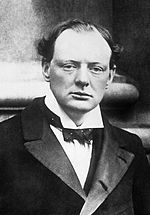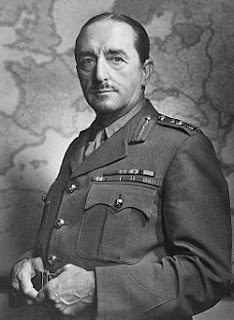Sir Winston Leonard Spencer Churchill, to use his full name, was a 20th century British statesman. His reputation in Britain and the West remains strong and he regularly tops press competitions to name, impossibly, the 'greatest figure in British history'. He was actually half British and half American, with de Gaulle once chiding that ‘pure English blood never produced a single strong man’. For much of Churchill’s life he was a highly controversial figure. He himself realised reputations changed with the longer perspectives of time. His own exalted place in folk memory rests on his first 18 months as prime minister from 1940 to 1941.
Among the hundreds of
Churchill biographies those of the distinguished historian Paul Addison,
and the former Cabinet minister and biographer Roy Jenkins, are rounded,
comprehensive and fair minded. They seem to set the standard. Despite his later
iconic status, why was Churchill so widely disliked and mistrusted in his
earlier career? Perhaps it’s best to separate the strands, relating first to
his personality, and second to his political views and actions.
Early antipathy
To start with Churchill was an emotional figure. Indeed he often burst into tears. His powers of judgment were unstable and he made lots of mistakes and quite a few enemies - “Hyperactive and transparently on the make, he was far from the English idea of a gentleman”, wrote Addison. He had a huge ego and always self-confidently believed himself to be ‘a man of destiny’. Not perhaps the best way to endear yourself to colleagues.
Churchill in 1904 when he 'crossed the floor'
A relentless self-publicist, he lacked restraint and could be reckless. After buying his Kent home, Chartwell, in 1922 he spent a lot of money and didn’t much care how he got it. In the aristocratic circle from which he came this was just not seen as comme il faut.
Many saw Churchill as motivated by personal ambition rather than political principle. Party defections, from Conservative to Liberal, then back to the Conservatives, hardly helped. His early parliamentary career showed him to be deliberately provocative and argumentative. His barbed rhetorical style earned him many enemies in the House of Commons. Excitable, and with a high opinion of himself, Churchill was viewed as a loose cannon. He wasn’t much loved in UK politics.
Chartwell
So what of Churchill’s political views and actions? Mainly liberal in outlook but always pretty hard to categorise. In his early ministerial career he had a good record on social policy, being supportive of trade unions and a committed prison reformer. His attitude was that of a ‘benevolent paternalist’, aiming to preserve Britain’s existing social structure, though not to challenge it. As Home Secretary in the 1906 Liberal government Churchill put his proposals efficiently through Cabinet and Parliament and carried his department with him.
But these plus points were lost in his subsequent
career. His stance on the Tonypandy unrest in the Rhondda Valley was never
forgiven or forgotten by the miners involved, though some of the press thought
he had been soft on the rioters. He was always an imperialist, long after its
heyday, and a strong, persistent opponent of Indian independence. As Chancellor
in 1925 he took Britain back to the gold standard, a bad move he later
regretted. With no knowledge or background in economics he lacked the intellect
to challenge the Treasury. And his opposition to the 1926 General Strike was a
red line for the Labour movement.
Fallout from the Dardanelles
But it was over Gallipoli, in 1915, that Churchill’s
reputation was most damaged. As First Lord of the Admiralty he proposed a plan
to relieve Turkish pressure on Russia in the Caucasus by forcing the
Dardanelles Straits. If successful its backers claimed it would knock Turkey
out of the war. An Anglo-French task force later boosted by ANZAC forces attacked
the Gallipoli Peninsula, but the venture was a costly disaster. Churchill was
held by many, particularly Conservative MPs, to be chiefly responsible. Under
pressure, PM Asquith agreed to form an all-party coalition, but the
Conservatives’ one condition was that Churchill be removed from the Admiralty.
In late 1915 in a depressed state he resigned from the government and joined the army for a few months before being appointed Minister of Munitions. For some reason Churchill considered himself a military genius but of course this made him vulnerable to failure. Never good with operational details like sea depth or topography, Gallipoli exposed the limits of his understanding. It was toy soldier stuff. Addison wrote that the fiasco was “the greatest blow his self-image was ever to sustain”.
PM and Defence Minister?
As Prime Minister in the 1940s Churchill created for
himself the new post of Defence Minister. But it’s a strangely persistent myth that
he was a good war strategist. Immediately after the withdrawal from Dunkirk he
insisted on sending fresh troops to France in a half-baked attempt to stem the
German advance. Chief of the Imperial General Staff (CIGS) Lord Alanbrooke’s
memoirs here make some uncomfortable reading. Norway and Turkey, always
Churchill obsessions, remained favourite areas to attack. Madagascar and
Sumatra, with the Aegean islands, were later included. None of this made the
slightest sense.
He enjoyed eating and drank enthusiastically, sometimes
to excess. He suffered strokes and respiratory problems (not made public) that
needed prolonged treatment during which he was effectively out of action. He
was not really grabbed by domestic politics or national administration. And he
went on numerous extended trips overseas. From 12 January 1943 when he left for
the Casablanca Conference, Churchill was abroad and/or seriously ill for 203 of
the next 371 days, well over half the period.
Master of the English language
Fortunately the UK coalition government was well
organised with some capable figures to manage affairs day to day. The population and economy were on a war footing. It required a degree of discipline
and planning that Churchill might have regarded as too ‘socialist’ had he really thought about it. But he saw it was vital for the country to pull
together in all senses if it was to prevail.
Stories of late night drinking sessions with service
chiefs, watching films of Churchill’s choice, well - you feel the
embarrassment. The CIGS and other military leaders had endless arguments with
Churchill and soon learned to shield their plans from him. They had to stop his
interventions doing too much harm while keeping the USA and other allies onside.
Churchill, with his rather Victorian outlook, didn’t understand modern warfare,
the need to service tanks and aircraft, plus the demands of communications and
logistics. He never accepted why, with an army of 300,000, only 100,000 could
be put in the combat field. Alanbrooke wrote, “We couldn’t have won the war
without him but we damn near lost it with him”.
Getting it right
So why is Churchill seen as a great man, indeed among
the greatest? He was keen to burnish his own image and reputation, of course. And he was a master of the photo-op. But in truth the answer is surely that on three crucial issues he was right. First,
against common wisdom, he opposed the appeasement of Hitler from 1933. The
horrors of World War I were still raw in the public mind. And while most of the media
and political sentiment was focused on doing anything to avoid a repeat, he saw clearly
that Nazism had its own evil trajectory. So evil that, whatever the cost, it
had to be stopped. This was not a popular stance, until war began. But it was
the right one.
When he became prime minister in May 1940, many were
worried that a warmongering loose cannon was to be in charge. But he showed true
leadership and proved just what was needed. His first Commons address was the “blood, toil, tears and sweat” speech to
prepare the country for a long war. It included phrases reverberating ever
since. “You ask what is our aim? I can
answer in one word: it is victory, victory at all costs, victory in spite of
all terror, victory however long and hard the road may be; for without victory
there is no survival.”
Using the power of English
Churchill used his mastery of the English language to
rally Britain and put some backbone into the public mood. He wrote the speeches
himself, then practised them alone until the words, flow and timing were right.
His efforts succeeded brilliantly, but as they were given mainly in the Commons,
few people actually heard them live at the time. Yet it showed he was serious. And while
he knew that Britain was in little danger from a German invasion, even had one
been attempted, he realised it was vital to galvanise the country and the
Commonwealth for the prolonged struggle to come.
When in late May 1940 Foreign Secretary Lord Halifax
wanted to seek Mussolini’s mediation with Hitler for Britain to come to terms,
his initiative was defeated in the War Cabinet. Some writers and film makers
have said Churchill came close to agreeing this. But with fellow Cabinet
members Attlee, Greenwood and Sinclair all strongly opposed (ignored by some of
these writers with ‘dramatic licence’), as well as the 25 strong outer Cabinet,
there was no realistic prospect of this. The public mood had completely changed
too, and the nation had little appetite for any accommodation with Hitler.
The final critical thing that Churchill got right was to court the Americans. For while the USA didn’t enter the fray until Germany declared war in 1941 after Pearl Harbor, Britain benefited from US destroyers, war materiel and other supplies from 1940 under Lend-Lease. Churchill always knew that a friendly USA was vital to at least avoiding defeat. He stayed close to Roosevelt and used his charm to impress the American public and administration. In his speeches he spoke in stentorian tones of the New World coming to the aid of the old and used mention of his American mother to political effect. He relied on experience to try and avoid obvious sore points, like British imperialism, which would inflame the Americans.
A man in full
So Churchill became a huge figure in British history, at least from 1940-41 as a war leader, even if not at all in the way some people might imagine. Arthur Marwick called him "one of my least favourite politicians", but that is to ignore his aura, and his warm personality. A romantic, yes, but a very human one. The persona he projected was attractive to many people, in Britain and abroad. He could communicate effectively, wrapping the nub of an issue for public consumption in just a few words which resonated.
Writer and journalist, as well as soldier and politician, he also loved painting (with some of his works accepted by the Royal Academy), plus horse racing and bricklaying, among much else. There was lots in his life, including a supportive wife, Clementine, and children. A man of many parts or as novelist Tom Wolfe might have had it, “A man in full”.
It’s interesting that when Gladstone’s biographer, fellow politician Roy Jenkins, began his life of Churchill, he regarded Gladstone as the greater man, but changed his mind while writing it. The huge power of Churchill's personality swayed him. He ended by ranking Churchill: “…with all his idiosyncrasies, his indulgencies, his occasional childishness, but also his genius, his tenacity and his persistent ability (to be) larger than life, as the greatest ever (occupant of) 10 Downing Street”.







No comments:
Post a Comment